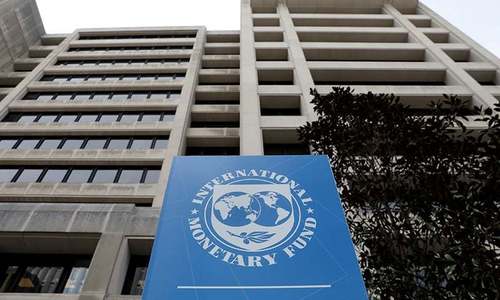Pakistan to get $1.65bn net receipts out of $6bn IMF package

ISLAMABAD: Pakistan will get net receipts of about $1.65 billion in four years from the International Monetary Fund (IMF) under the just concluded $6bn bailout as it delivers on a steep macroeconomic adjustment plan.
A senior government official told Dawn that beginning this year Pakistan will receive a total of $6bn in about three years ending 2021-22 from the IMF, while it has to repay about $4.355bn in four years ending 2022-23, showing net receipts of $1.65bn.
He said the government is expected to receive first disbursement of about $1bn this week under the $6bn Extended Fund Facility (EFF) that would boost the foreign exchange reserves in the short term, but its repayment obligations under the previous $6.4bn EFF have already begun.
Islamabad has to repay about $4.35bn in four years
The Fund’s previous EFF had envisaged a repayment period ranging between four-and-a-half years and 10 years, with repayments in 12 equal semi-annual installments. The 12 disbursements by the IMF had started during the fiscal year 2013-14 and completed in September 2016. The repayments under that programme started in March 2019 with $532 million, including $70m interest charges, and will continue until June 2026.
Therefore, in the near term net inflows during the 39-month period of the programme from the IMF are estimated at $2.72bn. Pakistan will receive $2.3bn during the current fiscal year, followed by $1.847bn next year (2020-21) and $1.847bn in 2021-22. During the current fiscal year, Pakistan has to make repayments of $1.045bn, followed by $1.167bn in 2020-21 and $1.06bn in 2021-22. This means the net inflows will amount to $1.26bn during the current fiscal year, followed by $680m next year and $786m in 2021-22.
In contrast, there will be no inflows from the IMF during the fiscal year 2022-23, but $1.08bn repayments to the Fund will be due that year. After accounting for $532m repayments last fiscal year and due until 2022-23, Pakistan’s inflows from the Fund will be $6bn against the outflows of $4.9bn, meaning net inflows of just $1.1bn over the five-year period.
However, the programme is expected, in the words of the IMF, “to coalesce broader support from multilateral and bilateral creditors in excess of $38 billion, which is crucial for Pakistan to meet its large financing needs in the coming years”.
This will include about $8.7bn project loans, $4.2bn programme loans (mostly from the World Bank and the Asian Development Bank), about $14bn of rollover loans (from Saudi Arabia, the UAE, China, Qatar and Islamic Development Bank) and up to $8bn in commercial loans. This will also include borrowing from the international capital market at least $1bn per annum.
As part of the IMF package, Pakistan has committed a comprehensive reform programme to stabilise the economy and lay the foundation for a robust and balanced growth. That would mean the economic growth rate going down to 2.4 per cent during the current fiscal year, compared to 3.3pc of GDP last year ending June 30, 2019.
Likewise, the rate of inflation has been projected at 13pc under the IMF programme. The authorities have promised the keep the State Bank of Pakistan’s policy rate at least 1.5pc higher than the projected inflation. This means the policy rate will further go up to 14.5pc from 12.25pc at present.
Also, the fiscal deficit will stay stagnant at about 7.1-7.3pc, while general government debt will further go up to almost 77pc of GDP during the current year, up from about 75pc of GDP last year. The current account deficit is estimated to reduce from 4.6pc of GDP to 2.6pc during the current year.
The government has promised in writing a decisive fiscal consolidation to reduce public debt and build resilience, starting with the adoption of an ambitious FY2020 budget. The adjustment will be supported by comprehensive efforts to drastically increase revenue mobilisation by 4-5pc of GDP at the federal and provincial levels during the 39-month period.
The government has also agreed to ensure a flexible, market-determined exchange rate to restore competitiveness, rebuild official reserves and provide a buffer against external shocks. This will be supported by an appropriate monetary policy to shore up confidence and contain inflation, conducted by an independent central bank.
The authorities will also ensure energy sector reforms to eliminate quasi-fiscal losses and encourage investment, including by depoliticising gas and power tariff setting and within three years gradually bringing the sector to full cost recovery.
The structural reforms will be ensured through strengthening institutions, increasing governance and transparency and promoting an investment-friendly environment to improve productivity, entrench lasting reforms and ensure sustainable growth.
Published in Dawn, July 8th, 2019














































